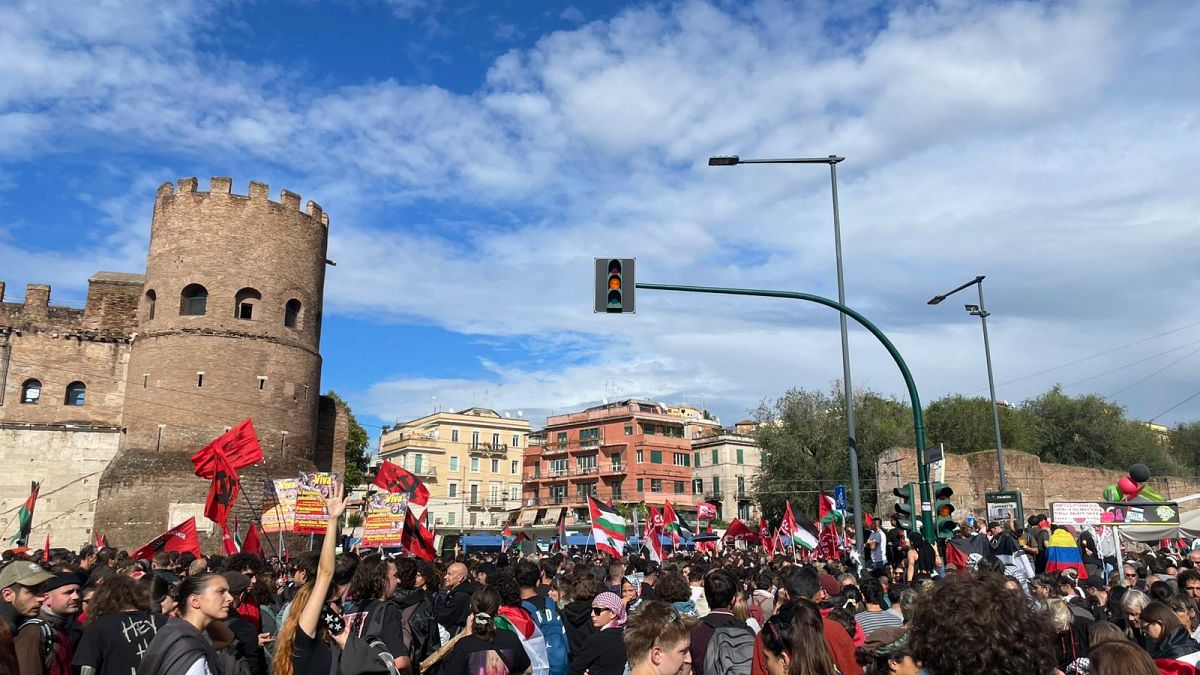France’s president urges an end to arming of Israel amid more protests

Macron called for a political solution in Gaza and halting arms deliveries to Israel, putting France at odds with the US, as pro-Palestinian protests surged across Europe on Saturday.
“I think that today, the priority is that we return to a political solution, that we stop delivering weapons to fight in Gaza,” Macron said in an interview with France Inter.
He also confirmed that France is no longer sending arms to Israel.
The comments put France at odds with the US, which gives Israel €3.4 billion in military aid every year as part of a 10-year agreement.
As Macron spoke, thousands of pro-Palestinian protesters were gathering in central Paris to demand an end to the wars in Gaza and Lebanon.
In Rome, Brussels, London and Athens, thousands more were protesting on Saturday afternoon, nearly a year to the day when the war first broke out.
Massive rallies are planned in several European cities, with the largest gatherings expected from Saturday to Monday. Events will peak on Monday, the anniversary of Hamas’ attack on Israel.
By midday Saturday, thousands had gathered in central London’s Russell Square amid a significant police presence. Some of the march’s organisers had said they planned to target companies and institutions they claimed were “complicit in Israel’s crimes,” including Barclays Bank and the British Museum.
Scuffles broke out as police officers pushed back activists trying to get past a police cordon. Two people were arrested, London’s Metropolitan Police said.
Ben Jamal, director of the Palestine Solidarity Campaign in Britain, said he and others will keep organising marches until action against Israel is taken.
“We need to be out on the streets in even bigger numbers to stop this carnage and stop Britain being drawn into it,” Jamal said.
In Rome, a few thousand demonstrators gathered in spite of a ban by local authorities who refused to authorize protests in the Italian capital, citing security concerns. Protesters chanted, “Free Palestine, free Lebanon.”
Rallies are also taking place in other parts of the world. In the Philippines on Saturday, dozens of left-wing activists protested near the US Embassy in Manila, where police prevented them from getting closer to the seaside compound.
Security forces in several countries warned of heightened levels of alert in major cities amid concerns that the escalating conflict in the Middle East could inspire new terror attacks in Europe or that the protests could turn violent.
Pro-Palestinian protests calling for an immediate cease-fire have repeatedly taken place across Europe and around the globe in the past year and have often turned violent, with confrontations between demonstrators and law enforcement officers.
Italian authorities believed that the timing of Saturday’s rally in Rome risked the Oct. 7 attack being “glorified,” local media reported.
Interior Minister Matteo Piantedosi also stressed that, ahead of the key anniversary, Europe is on high alert for potential terror attacks.
In Berlin, a march is scheduled from the Brandenburg Gate to Bebelplatz on Sunday. Local media reported that security forces have warned of potential overload due to the scale of protests. German authorities pointed to increasing anti-semitic and violent incidents in recent days.
France was also on alert for new protests on Saturday. Earlier this week, Interior Minister Bruno Retailleau warned the country’s regional prefects, expressing concern about possible tensions and saying that the terrorist threat was high.
On 7 October last year, Hamas launched a surprise attack on Israel, killing 1,200 Israelis, taking 250 people hostage and setting off a war that has shattered much of the Hamas-controlled Gaza Strip.
More than 41,000 Palestinians have been killed since then in Gaza, according to the Gaza Health Ministry, which does not differentiate between fighters and civilians.
Nearly 100 Israeli hostages remain in Gaza, with fewer than 70 believed to be alive. Israelis have experienced attacks — missiles from Iran and Hezbollah, explosive drones from Yemen, fatal shootings and stabbings — as the region braces for further escalation.
In late September, Israel shifted some of its focus to Hezbollah, which holds much of the power in parts of southern Lebanon.
Related
A New Book Argues That What Happens in Europe Doesn’t…
Remaking the World: European Distinctiveness and the Transformation of Politics, Culture, and the Economy by Jerrold Seigel “No issue in world
Poland plans military training for every adult male amid growing…
Poland’s prime minister, Donald Tusk, has said his government is working on a plan to prepare large-scale military training for every adult male in response t
2025 European Athletics Indoor Championships: Ditaji Kambundji secures women’s 60m…
Switzerland’s Ditaji Kambundji walked away from the 2025 European Athletics Indoor Championships in Apeldoorn on 7 March with much more than her first Europea
Takeaways from the EU’s landmark security summit after Trump said…
BRUSSELS (AP) — European Union leaders are trumpeting their endorsement of a plan to free up hundreds of billions of








